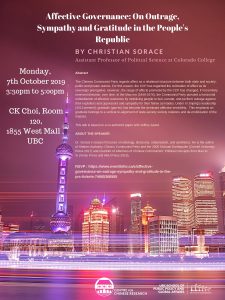
Abstract
The Chinese Communist Party regards affect as a relational structure between both state and society, public and private realms. For this reason, the CCP has regarded the cultivation of affect as its sovereign prerogative. However, the range of affects promoted by the CCP has changed, if not entirely reversed direction, over time. In the Mao era (1949-1976), the Communist Party pursued a horizontal redistribution of affective resources by mobilizing people to feel, narrate, and perform outrage against their exploiters and oppressors and sympathy for their fellow comrades. Under Xi Jinping’s leadership (2012-present), gratitude (gan
Talk is based on a co-authored paper with Jeffery Javed.
About the Author
Dr. Sorace’s research focuses on ideology, discourse, urbanisation, and aesthetics. He is the author of Shaken Authority: China’s Communist Party and the 2008 Sichuan Earthquake (Cornell University Press 2017) and co-editor of Afterlives of Chinese Communism: Political Concepts from Mao to Xi (Verso Press and ANU Press 2019).